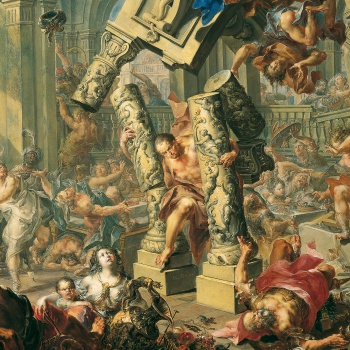Author: Jonathan Green
-
Feeding the hungry has negative ROI
The holiest service you perform, the kind of service Jesus asks of those who would be his disciples, will not be rewarded with success, respect, or even a lot of happy feelings. That was never part of the bargain, and you should be aware of that in advance.
-
Vigilance is not panic
Morgan, thanks for your guest post. Several people have asked: Why do we do this, if I’m not going to change your mind and you’re not going to change my mind? But I think arguing with people online actually can accomplish some useful things. For one, it demonstrates that faithful church members can’t be simply…
-
17 Thoughts About Resistance
1—To get this out of the way: There was no good answer to the question of how the Church should have responded to Nazism. There was no safe middle ground between complicit engagement, impotent resistance, and needless death. If letting missionaries train the German basketball team had a .01% chance of making war less likely,…
-

Delighting in bloodshed
The first time I showed clips from Leni Riefenstahl’s Triumph of the Will while teaching about Nazi Germany, I was not expecting to be overwhelmed by grief and anger and revulsion.
-
Devotion in the Postinformation Age
There was a time, not all that long ago, when the Internet was going to solve everything. The truth was out there, freely accessible, and could no longer be hidden. All you had to do was look, and if you remained ignorant, it was both an intellectual and a moral failure.
-
Vocabulary lesson
die Dolchstoßlegende. The myth that the German Empire could have won World War I if its army, like Siegfried in the Nibelungenlied, had not been stabbed in the back by traitorous enemies, often claimed to be Jews, rich industrialists, or socialists. The German ß character can be replaced by a double -ss- in English contexts.…
-
The New Apostolic Reformation and you
You should probably pay attention to a religious movement that shares some of our beliefs and uses some similar terminology, wants to control key institutions of society, and includes Donald Trump’s spiritual advisor.
-
Requiem for the Mormon Tribe
Of all the changes introduced during the prophetic ministry of Russell M. Nelson, one of the most consequential may be the determined and consistent rejection of the Mormon ethnonym. That decision was a turning point that enabled some future paths and closed off others, just as ending polygamy opened a path into the American mainstream…
-
Conservative pain
An intrinsic problem in liberal and progressive-dominated professions such as academia and journalism is systematically overlooking or diminishing conservative pain. I’m not asking for sympathy for myself here, as I’m not a conservative. Each day I watch in horror as much of what has made my life pleasant or possible is destroyed and generation-spanning work…
-
Do you forsake Mormon celebrities?
Do you forsake Mormon celebrities? Yea, I forsake. Do you forsake vicarious satisfaction in their professional success? Yea, I forsake. Do you forsake their works and fandom that you served in former times? Yea, I forsake.
-

The Institute and Religion
In the television production of Stephen King’s The Institute, Avery Dixon is a ten-year-old telepath who has been snatched from his home in Salt Lake City and taken to a facility for psychically gifted children. In the book, however, Avery is specifically a “Mormon from Orem.” (Spoilers follow!)
-
10 Thoughts on Dietrich Bonhöffer’s Discipleship
If you’re interested in quotable mid-century Protestant theologians, Dietrich Bonhöffer may be more directly relevant for us today than C.S. Lewis. Bonhöffer’s 1937 book, Nachfolge, is best known for its discussion of “cheap grace,” but there’s a lot more going on.
-
The good ending
The vulgarity and low character of Donald Trump are famously at odds with the values and teachings promoted by the Church, but another area of conflict has been less apparent despite its impact. For the Church, the Trump presidency is an apocalyptic catastrophe in the technical sense: at least a postponement and potentially a mortal…
-

-
Notes on Don Bradley’s Lost 116 Pages
This is about six years too late to count as a book review, but Don Bradley’s The Lost 116 Pages: Reconstructing the Book of Mormon’s Missing Stories is excellent. It is a rare combination of scriptural investigation and historical whodunit that is both fascinating and insightful.
-
Making Sense of Prophecies: An Update
A while ago, I published a series of posts, “Making Sense of Prophecies,” that connected my academic research to the prophecy of “Lutius Gratiano.” (You know the one: “The old true gospel and the powers thereof are lost….”) Then the editor of the Journal of Mormon History suggested the topic might work as an article.
-
The Confessing Church
People are probably going to bring up the Confessing Church frequently, so it’s best to get some things straight at the outset.
-

Civil religion and imperial cult
What does it mean to abstain from food polluted by idols? It’s one of the more pressing questions that we face today.
-
Hunger
During those infrequent occasions when I’ve been able to teach pre-modern history and literature, one of the surprisingly consistent elements of the material we look at is hunger.
-
This is bad for the Church
Personalist autocracies are bad for 99.99% of the people who live under them. By enabling bribery and corruption, they’re a significant drag on the economy. A few people get rich, while everyone else ends up worse off. By promoting incompetent but loyal functionaries, they make it difficult to accomplish important government tasks or provide the…
-
It’s bad
In polite society we treat elections as an opportunity to advance our self-interest or express policy preferences, about which reasonable people can disagree. And most of the time that may be true and we’re left to choose between various imperfect options, but in this era I think the dwindling tribe of values voters has it…
-
Lost books, golden plates, and Mosaic authorship
Call it an archetype, call it folklore. Whatever you call it, the idea of finding something fantastical in an old book in a library, or in a book hidden away centuries ago, is one of those things that rattles around in our minds and has been rattling around our culture for centuries if not millennia:…
-
On the inefficacy of Zoom sacraments: a note on media and religious history
A telling aspect of the Restoration is what the golden plates couldn’t do.
-
It’s not about the Christmas trees
For the last several weeks, Syria has been a rare and unlikely bright spot in a grim world.
-
The war hymns bring me solace and comfort
Periodically someone or another will issue a call to remove hymns with militaristic themes or martial music from the hymnbook, or at least rewrite them to make them overtly pacifistic. The sentiment is noble and understandable, but mistaken. The new hymnbook may reduce the number of martial hymns or soften their edges, but I hope…
-
Rational belief in Book of Mormon historicity III: Why I believe
In the last two posts, I’ve argued that a limited chronology model primarily focused on Mosiah-3 Nephi 7 doesn’t excessively strain historical plausibility, and then turned around and argued that 1 Nephi-Enos was a living text that was adapted to reflect the state of the Nephite coalition around the time of Benjamin and later. But…
-
Rational belief in Book of Mormon historicity II: A historicist reading and reconstruction of 1 Nephi-Enos
Approaching the Book of Mormon as a historical text helps make sense of aspects of the book that an exclusive focus on the text as a work of fiction or on its nineteenth-century context overlooks. Several of these aspects relate to the opening books, from 1 Nephi to Enos. One aim of these books is…
-
Rational belief in Book of Mormon historicity I: a limited chronology model
Over the next few posts, I’m going to sketch out an argument that believing in the historicity of the Book of Mormon is a rational choice. To put it briefly: the Book of Mormon does not need to strain historical plausibility nearly as much as it might seem; treating the Book of Mormon as a…
